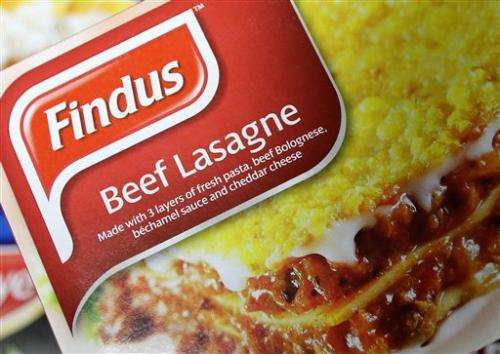Horsemeat scandal reaches Sweden (Update)

Sweden on Friday became the newest European country to be hit by a widening meat products scandal, as frozen-food company Findus said it was recalling beef lasagna meals there after tests confirmed the products contained horsemeat.
Already, Britain, Ireland, Poland and France have been drawn into the growing saga over the use of horsemeat and the apparent mislabeling of products along the supply chain. Millions of burgers have been recalled in recent days due to the scandal.
Eating horsemeat is not generally a health risk, but the cases have spurred disgust in places where such meat is far from a staple.
Earlier this week, Findus said it was recalling beef lasagna meals in Britain because of concerns raised by its French supplier Comigel. Tests later found that some of those meals contained between 60 to 100 percent horsemeat instead of beef.
Then on Friday, a second British company, Aldi, confirmed that tests on Comigel-supplied products it had recently recalled—beef lasagna and frozen spaghetti bolognese—showed some contained between 30 and 100 percent horsemeat.
Aldi said it felt "angry and let down" by Comigel and that it was severing ties with the French supplier.
Britain's Food Standards Agency said that in light of the latest information from Aldi, it is working with French authorities and recommends that any companies that have sourced beef products from Comigel "conduct a precautionary withdrawal of product."
Findus official Henrik Nyberg said about 20,000 frozen lasagna meals are being recalled in Sweden. Nyberg told The Associated Press that the products don't pose any food safety risk, and were recalled solely because they had been mislabeled.
British Prime Minister David Cameron said Friday that the scandal is "completely unacceptable" and must be addressed.
Cameron acknowledged there is "great public concern" around the "very shocking" issue, saying "people will be very angry to find out they have been eating horse when they thought they were eating beef."
The British leader said his country's secretary of state for agriculture is speaking with ministers and will meet with Britain's Food Standards Agency because "this does need to be dealt with."
Officers from Scotland Yard also have met with the Food Standards Agency over the horsemeat scandal, but the police force said there is currently no official investigation.
Concerns about the use of horsemeat burst into the spotlight earlier this year, after it emerged that beef products from three companies in Ireland and Britain contained horse DNA. That led to the massive recall of burgers.
The revelations have shaken Ireland in particular because beef exports are a key industry. Irish government officials and an Irish meat company have blamed meat imported from Poland, but Polish authorities say they have found no evidence backing those claims.
Copyright 2013 The Associated Press. All rights reserved. This material may not be published, broadcast, rewritten or redistributed.


















